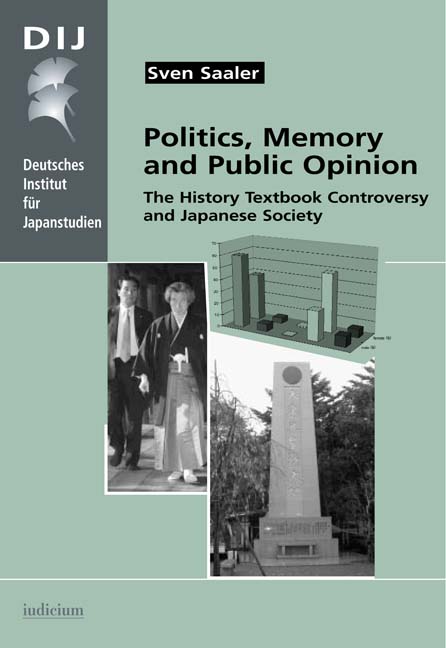Japan und Ostasien
Germanistik /
Deutsch als Fremdsprache
Kulinaristik
Kulturwissenschaften
|
 |
Senden Sie Fragen oder Kommentare zu dieser Website an:
info@iudicium.de
iudicium verlag
Dauthendeystr. 2 · 81377 München
Deutschland
Copyright · 2024
|
|
| |
|
 Saaler,
Sven Saaler,
Sven
Politics, Memory and Public Opinion.
The History Textbook Controversy and Japanese Society
2. Auflage 2006 • ISBN 978-3-89129-850-3 •202 Seiten,
kt. ·
EUR
28,-
Deutsches Institut für Japanstudien (Hg.):
Monographien, herausgegeben vom Deutschen Institut für Japanstudien (Bd. 39)
This volume explores the political and social backgrounds
of the ongoing history textbook controversy in Japan. In chapter 1, the
resurgence since the 1990s of the conservative interpretation of history
known as historical revisionism is identified as the major reason for the
renewed debate. Chapter 2 demonstrates that, as a consequence of this strong
connection between revisionism and politics, perspectives on Japan’s recent
history underlying the "culture of memory" as it is manifested in the public
sphere—in memorials, museums and ceremonies—are increasingly similar to
those advocated by historical revisionism. This is particularly true
regarding the interpretation of the Asia-Pacific War (1931–1945), which here
is often depicted as a defensive war or as a war waged for the "liberation"
of Asia.
But however forcefully expressed, these views fall short
of reflecting a consensus on history in Japanese society at large. In
chapter 3, a number of opinion surveys inquiring into the "historical
consciousness" of the Japanese are analyzed. The results of these surveys
indicate that revisionist views face an uphill battle in Japanese society
and rather have to be considered a minority position at present. The
explosive character of the history textbook controversy above all reflects
the discrepancy between the historical views of the political class and
those presented in the public sphere, on the one hand, and those predominant
in the wider society on the other. The anticipated next round of the history
textbook debate, in the 60th anniversary year of the end of the war, will
not be adequately understood without some knowledge of the backgrounds to
the debate and the issues related to it.
Table of
Contents
Foreword by the Director
Preface
Introduction
1. Historical Revisionism in Contemporary Japan
1.1 The Revival of Historical Revisionism
1.2 The Formation of the Tsukuru-kai
1.3 The Tsukuru-kai’s Aims and Agenda
1.3.1 The Pilot Project: Kokumin no Rekishi
1.3.2 The Tsukuru-kai’s "New History Textbook" and "New
Civics Textbook"
1.4 Textbook Approval and Selection 2000/2001
1.5 The Tsukuru-kai and Politics
1.5.1 Historical Background: The Debates of the mid-1990s
1.5.2 Contemporary Political Debates
2. Historical Revisionism and the Politics of Memory
2.1 The Yasukuni Problem
2.2 The Historical Narrative of the Yûshûkan
2.3 Historical Interpretations Underlying Other Memorials
2.3.1 Chidorigafuchi
2.3.2 Shôwakan and Heiwa
Kinen Tenji Shiryôkan
2.3.3 Daitôa Seisen Taihi
2.4 The Debate over a New National Memorial to
Commemorate the War Dead
2.5 Commemoration, the Nation, History and Memory
3. History and Public Opinion
3.1 Historical Consciousness
3.2 Changes in Views of History within Japanese Society
3.3 The Quest for an Historical Consensus in Movies,
Novels and Museums
3.3.1 Academic History and the Mass Media
3.3.2 Historical Novels
3.3.3 Memoirs and Autobiography
3.3.4 Museums
Conclusions and Outlook
References
Appendix |
|
|
|
